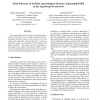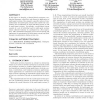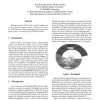2812 search results - page 7 / 563 » Secrecy in Multiagent Systems |
JCS
2010
13 years 6 months ago
2010
Protocol authentication properties are generally trace-based, meaning that authentication holds for the protocol if authentication holds for individual traces (runs of the protoco...
ATAL
2003
Springer
14 years 1 months ago
2003
Springer
Abstract. Starting from a general definition of how to model the organisation of multiagent systems with the aid of holonic structures, we discuss design parameters for such struc...
CCGRID
2003
IEEE
14 years 1 months ago
2003
IEEE
Open multi-agent systems need to cope with the characteristics of the Internet, e.g., dynamic availability of computational resources, latency, and diversity of services. Large-sc...
ATAL
2005
Springer
14 years 2 months ago
2005
Springer
In this paper we describe a channel-based exogenous coordination language, called Reo, and discuss its application to multi-agent systems. Reo supports a specific notion of compo...
IAT
2007
IEEE
14 years 9 days ago
2007
IEEE
Multiagent systems (MAS) satisfy to design requirements for open physical complex systems. However, up to now, no method allows to build software/hardware hybrid multiagent system...



